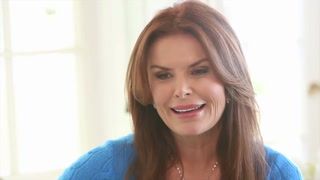
Tags
ABC’s Linsey Davis on How Faith Helped Her Overcome Postpartum Anxiety
Following the birth of her first child, broadcast journalist Linsey Davis experienced anxiety so pronounced that her blood pressure rose to dangerous levels.
View Transcript
Hi, Guideposts. My name is Linsey Davis. I’m a correspondent for ABC News.
And I cover just about everything, a wide variety of story topics, from natural disasters, to man-made disasters, international stories from the earthquake in Haiti, to the mall massacre in Nairobi. Most recently, I’ve been doing a lot of the MeToo movement, as well as race relations in our country. And I’m also a mom and a wife.
I’ve always been a really healthy person as far as not having any kind of major medical concerns. And so going into pregnancy and delivering the baby, I was always just so focused on praying for the health of the child. And everything seemed to go really smoothly. As matter of fact, we got there and the baby came right away.
Initially, the doctor came in and said, everything looks great. And you’re going to be able to go home within the next 24 hours. And then she left the room, and within a matter of minutes, came back and they had a different tone, a different feel entirely. And she said, we we’ve got some of your labs back, and we’re concerned about your blood pressure. And you have something called preeclampsia.
And so now I ended up staying in the hospital for a week. And during that time, they were giving me different kinds medication, and my blood pressure just wasn’t responding to it. It wasn’t going down. And so it was a really frustrating, defeating feeling for the first time in my life that I ever felt so helpless, and just unable to really properly care for my newborn child, my first born child and only child.
While I was in the hospital, “The New York Times” had published a story about white coats syndrome. And it was something that I was not familiar with, but the idea is that people can get this elevated fear, anxiety when they’re in a medical kind of situation as I was. I really need to be able to conquer this, because whenever I hear those wheels coming with the blood pressure monitor, it really gets me nervous.
And so she said, you know what? We’re going to leave the monitor with you. We’re going to let you take your blood pressure yourself. And you can do it as many times as you want. If you can get the numbers down, then we’re going to let you go.
I did it multiple times. And ultimately, I was able to get it one number below where she said the threshold was. And so then they ultimately did release me.
And then I started just panicking thinking maybe I didn’t really have white coat syndrome. Maybe my blood pressure really was high because I have this medical issue, and I’m not going to be able to get better. And I’m going to go home, and I’m going to have a stroke. It really was preventing me from having this connection with my son, because I was so worried that I was going to die. It was just this postpartum anxiety that I was suffering from.
I think that through my life, I had always believed in God, but I hadn’t had to really depend on him. I think that it’s so easy for us to be faithful when everything around us is good, right? But it’s in those dark times, and it’s in times when you really feel like you’re perhaps hitting rock bottom and feel so hopeless that I think that your relationship with God goes to a different level.
I have this really well-worn one year Bible. So I started reading different scriptures. And some of them, I tried to memorize for that day, so that it would just help me when I started feeling anxious.
Among the scriptures, it was Jeremiah 29:11, for I know the plans I have for you, plans to prosper you, not to harm you, to give you a future and a hope. That was my favorite one. That was really, because it was just saying that God has a plan for me. And it’s not to harm me.
And I needed that hope back. And the blood pressure started going down. And so I would guess that it was maybe after about a two month period where it was really back to normal, and I could say that I was myself again.
Growing up in my career of journalism, I always had different benchmarks of what I decided was going to be my goal for success, the measurement. And so I said by the time I’m 25, I want to be in a top 25 market. By the time I’m 30, I want to be at the network.
And now since I’ve had a child, it’s really changed how I would define success. And now for me, what’s most important is that I’m able to raise a son who loves God. That to me is now the benchmark.










